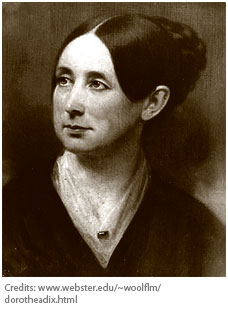
(Continuing with our 7 of the greatest Nurses in American History, check part 1 here: https://www.pulseuniform.com/coffee-time/index.php/2016/05/05/7-great-nurses-who-changed-american-history-clara-barton/ )

Bringing a reform
Dorothea Dix played an influential role in the establishment or expansion of more than 30 hospitals for the management of the mentally ill. She was a leading figure in those national and international movements that challenged the idea that people with mental disturbances could not be cured or helped. She also was a staunch critic of cruel and neglectful practices toward the mentally ill, such as caging, incarceration without clothing, and painful physical restraint. Dix may have had personal experience of mental instability that drove her to focus on the issue of asylum reform, and certainly her singular focus on the issue led to some important victories.
Tough childhood
Dorothea Lynde Dix was born in Hampden, Maine, in 1802. Data suggests she may have been neglected by her parents who were said to be alcoholic. She moved to Boston in 1814 to live with her rich grandmother. Dix became a schoolteacher even though she herself attended very little schooling. She established an elementary school in her grandmother's home in 1821, and 3 years later, published a small book of facts for schoolteachers that proved extremely popular. She went on to publish several works, including books of religious poetry and fictional texts featuring moral lessons. In 1831, Dix opened a secondary school in her own home.
A battle with sickness
She frequently suffered from bouts of illness, especially during the winter, developing a cough and general fatigue. By 1836, her intense commitment to teaching and demanding workload seemed to have taken its toll. She began to dwell on the idea of death, and felt overwhelmed by her physical illnesses. Perhaps her own struggles helped make her a more compassionate advocate for people who had been diagnosed as mentally unstable or insane. Certainly her ill health ended her teaching career. She recuperated in England and returned to Boston in 1837, just after the death of her grandmother. The inheritance she received enabled her to support herself fully and devote her time to reform and charitable work.
Working for the Mentally Ill
In 1841, Dix volunteered to teach Sunday school classes to female convicts in East Cambridge Jail. During her visits she saw people with mental illnesses who had been treated inhumanely and neglectfully, and she became determined to improve conditions. She began to investigate the treatment of the mentally ill in Massachusetts. She wrote a memorial which reveals how Dix worked within the conventions of her time to carve a role for herself in public life and draw attention to the horrendous treatment of the mentally ill in prisons, almshouses for the poor, and asylums. Ideals of femininity characterized women as having a special responsibility to the most vulnerable members of society, and a moral authority superior to men's. Her tireless work and dramatic testimonials highlighted the appalling conditions in existing institutions and promoted the inherent value of compassionate care.
(Information cited from: https://en.wikipedia.org/wiki/Dorothea_Dix, http://www.ncbi.nlm.nih.gov/pmc/articles/PMC1470530/)